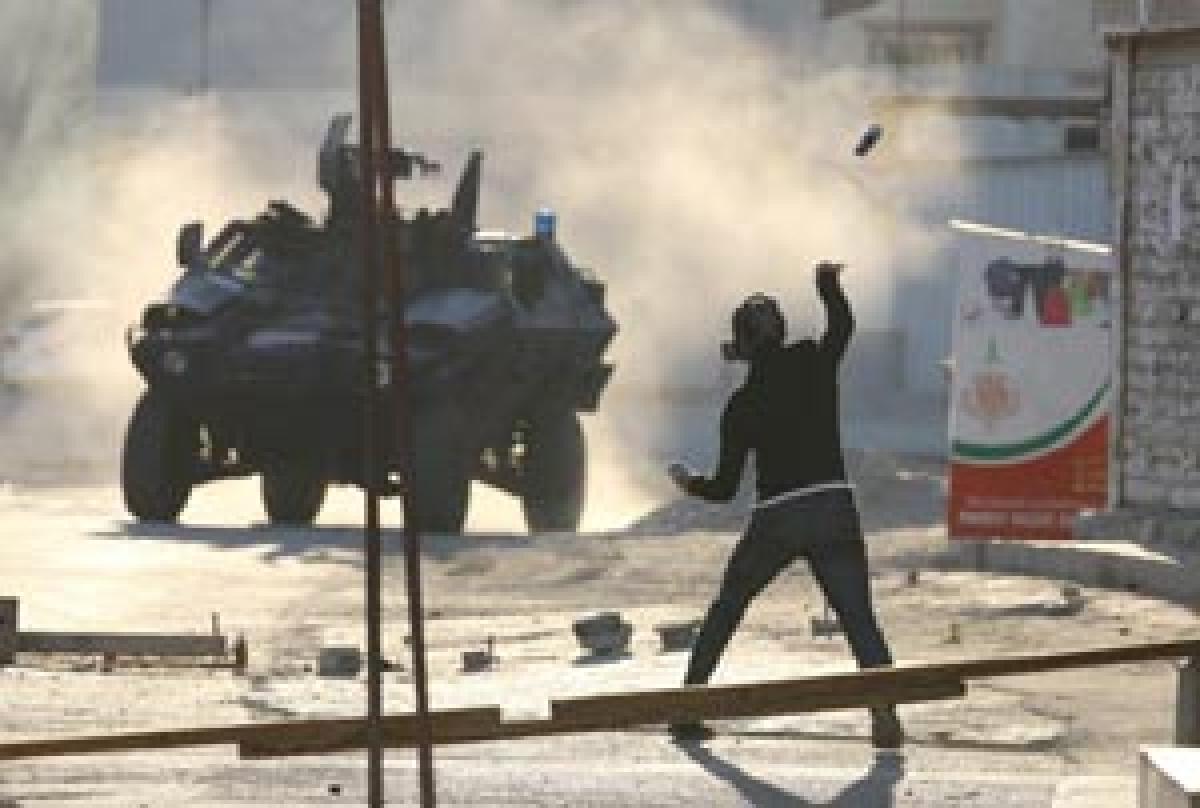Live
- WI vs Bangladesh Watch Controversial Banter Between Shakib and King
- EFLU Celebrates Bharatiya Bhasha Diwas
- Manchu Manoj Submits Bond of Rs. 1 Lakh to Rachakonda Commissioner
- Cuba denounces US 'theft' of Havana Club rum trademark
- Places of Worship Act: Mathura Shahi Eidgah mosque files intervention application in SC
- Violence erupts during 'Parbhani bandh'; MVA flays sacrilege to Ambedkar statue
- Addressing ethical challenges of AI, making social media accountable on fake news: Ashwini Vaishnaw
- Assam Congress to hold three-day review meeting to discuss bypoll debacle
- Indian pharma companies set to make further progress in US market in 2025: HSBC
- High Court Grants Relief to Mohan Babu, Orders Surveillance at Residence
Just In

Bahrain aims to end years of instability with a crackdown on Shi\'ite political parties, but it could be a gamble that risks further destabilising the Western-allied kingdom and the wider Middle East.
The United States and other Western countries have expressed alarm, but Bahrain appears to be calculating that the distaste will not translate into concrete reprisals against a country closely allied to key US partner Saudi Arabia
Dubai : Bahrain aims to end years of instability with a crackdown on Shi'ite political parties, but it could be a gamble that risks further destabilising the Western-allied kingdom and the wider Middle East. Five years after it crushed street protests with Saudi military support, the Sunni Muslim royal family that rules over a population with a Shi'ite majority appears convinced it will again weather international disapproval for tough measures.
In a series of moves over the past three weeks, authorities closed down the main Shi'ite opposition al-Wefaq Islamic Society, doubled the prison sentence on the group's leader, Sheikh Ali Salman, detained prominent rights campaigner Nabeel Rajab and stripped Ayatollah Isa Qassim, Bahrain's Shi'ite spiritual leader, of his citizenship.
The United States and other Western countries have expressed alarm, but Bahrain appears to be calculating that the distaste will not translate into concrete reprisals against a country closely allied to key US partner Saudi Arabia.
However, opponents say that by limiting peaceful ways to express their views through a recognised group like al-Wefaq, the government will only push Shi'ite youths into the arms of extremists. The concern is shared even by some who support the authorities. Regional analysts worry that an intensification of sectarian animosity in Bahrain could spill over into the wider region, where allies of Sunni Saudi Arabia and Shi'ite Iran are fighting proxy wars from Syria to Yemen.
The United States, which maintains its navy's Middle East headquarters in Bahrain, expressed alarm at the stripping of Qassim's citizenship. The UN human rights office said it was very concerned by what it called a "clearly unjustified" step. Bahrain has defended its actions as necessary for national security. The authorities accuse al-Wefaq and Qassim of promoting sectarianism and of links to Iran, which they blame for backing militants who have used improvised bombs to attack security forces, killing 17 officers since 2011, according to the interior ministry.
Iran denies fomenting violence. But the commander of an elite force in Iran's powerful Revolutionary Guards, Qassem Soleimani, responded to the stripping of the cleric's citizenship by suggesting Bahrainis may have no choice but to resort to "armed resistance" against the ruling Al Khalifa dynasty.
Some critics say Bahrain may have been encouraged to launch its latest crackdown by a timid response from Washington to the kingdom's suppression of protests five years ago, when "Arab Spring" demonstrations were sweeping the region. Bahrain's close ally Saudi Arabia, which allows no independent political parties of its own, has been sceptical of pro-democracy measures. Bahrain is connected by a causeway to Saudi Arabia's oil-rich Eastern Province, home to a large Shi'ite minority, and Riyadh worries that its own Shi'ites could be emboldened by gains by Shi'ites in Bahrain.
Some experts attribute the crackdown to a resurgence in influence of Bahraini government hardliners who see limiting Shi'ite power as a natural part of Arab opposition to non-Arab Iran, and who have been emboldened since reform talks stalled. However others say al-Wefaq shares the blame, after it, along with three smaller opposition groups, boycotted parliamentary elections in November 2014. That made the opposition vulnerable to accusations that it was not interested in dialogue. Al-Wefaq said it chose not to take part in the vote because the elected parliament would not have enough power and because voting districts favoured the Sunni minority.
By Sami Aboudi

© 2024 Hyderabad Media House Limited/The Hans India. All rights reserved. Powered by hocalwire.com







